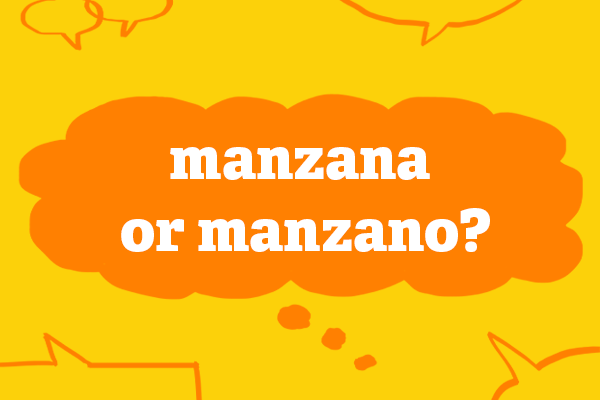It’s time to peel the layers off another pair of Spanish nouns which look similar in form but mean different things depending on their ending and gender. This week it’s the turn of feminine manzana and masculine manzano.
Manzana with an -a (feminine) is pronounced as follows:
You’ll come across manzanas in stories from Blancanieves (Snow White) to Adán y Eva (Adam and Eve), but you’ll also have encountered them in your lunchbox, your dessert or as windfalls under trees, since una manzana is…an apple:
Solo compró dos manzanas.
She only bought two apples.
una riquísima tarta de manzana
a very tasty apple tart
Me acuerdo de guardar las pepitas de la manzana.
I remember keeping the pips of the apple.
Una manzana podrida is a rotten apple or a bad apple, and just like the English terms, can be used of a person considered corrupt or having a corrupting influence:
En el ministerio, solo había una manzana podrida.
At the ministry, there was only one bad or rotten apple.
In a town una manzana is a usually rectangular area bounded by streets and either built on already or destined for building. So what is it? A block!
Dan la vuelta a la manzana y regresan al bar.
They go round the block and then back to the bar.
El coche estaba aparcado a pocas manzanas de la estación.
The car was parked a few blocks away from the station.
Manzano with an -o (masculine) is pronounced as follows:
If the word for a fruit is feminine and ends in -a, sometimes the tree the fruit grows on has almost the same name except that it is masculine and ends in -o. So what do you think un manzano means? That’s right! An apple tree.
Ni los ciruelos ni los manzanos han dado este año buena cosecha.
Neither the plum trees nor the apple trees have produced a good crop this year.
PUZZLE TIME
A. Can you work out the names of the trees the following fruits grow on?
- una cereza (a cherry)
- una ciruela (a plum)
- una naranja (an orange)
- una avellana (a hazelnut)
- una almendra (an almond)
- una castaña (a chestnut)
ANSWERS
- un cerezo (a cherry tree)
- un ciruelo (a plum tree)
- un naranjo (an orange tree)
- un avellano (a hazelnut tree)
- un almendro (an almond tree)
- un castaño (a chestnut tree)
B. Where or what is la Gran Manzana?
ANSWER
La Gran Manzana is the Spanish nickname of a city in the United States, whose name in Spanish is Nueva York. Where is it? The Big Apple itself: New York!
To slice apart another pair of nouns whose meaning varies depending on their gender and ending, come back next week.



